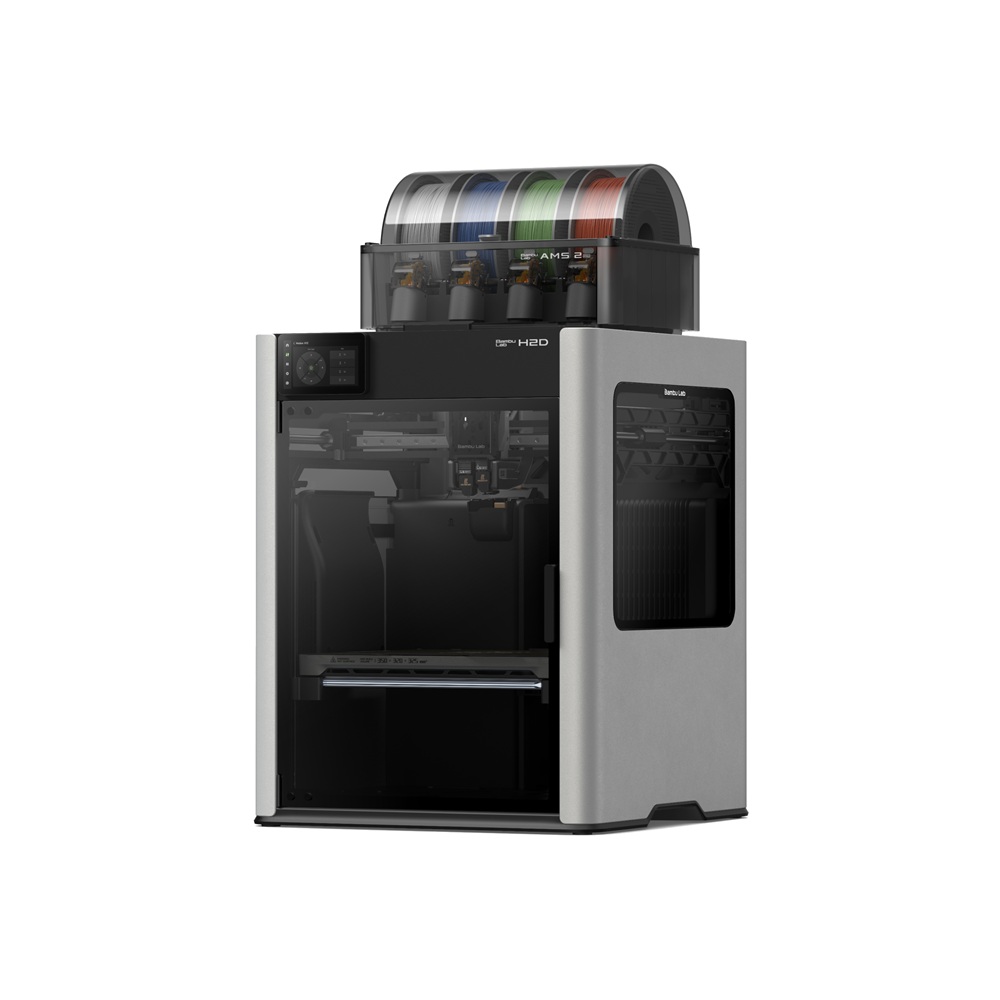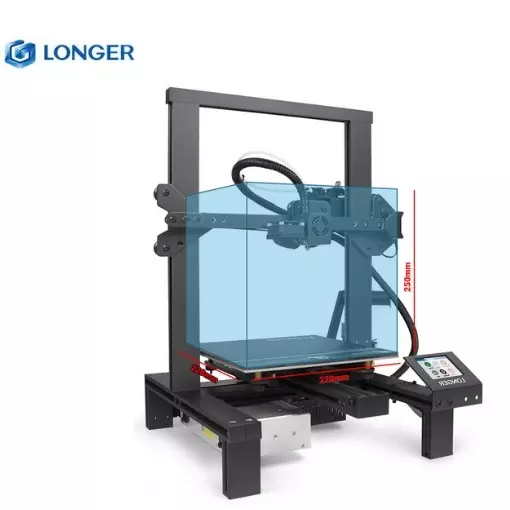Compare H2D vs LK4
Comparison between the best 3D printers
Choose the best 3D printer at the best price. The cheapest 3D printers are here.
Buy a 3D printer here with 3D Fila.
 |
 |
|
| Model | H2D |
LK4 |
| Printing Material | Filament | Filament |
| Buy Filament for Bambu Lab H2D | Buy Filament forLonger 3D LK4 | |
| Estimated price | $1899,00 | $200,00 |
| Manufacturer | Bambu Lab | Longer 3D |
| Release Year | 2025 | 2019 |
| Print Volume [mm] | 350x320x325 | 220x220x250 |
| Printer Size [mm] | 492x514x626 | 402x425x505 |
| Weight [kg] | 42,3 | 7,8 |
| Power Loss Recovery | YES | YES |
| Enclosed printer | YES | NO |
| Bed Leveling | Automatic | Manual com Assistência |
| Filament End Sensor | YES | YES |
| Bed type | Heated | Heated |
| Power supply system | Direct Drive | Bowden |
| Standard nozzle | 0,4 | 0,4 |
| Maximum Nozzle Temperature [°C] | 350 | 250 |
| Maximum Bed Temperature [°C] | 120 | 100 |
| Maximum printing speed [mm/s] | 600 | 120 |
| Filament holder | YES | YES |
| Camera for supervision | YES | YES |
| Recommended filaments | PLA, PETG, ABS, ASA, TPU, PVA, Nylon (PA) | PLA, TPU, ABS, PETG |
| Recommended slicers | Bambu Studio | Cura, Simplify, Slic3r |
| Maximum Resolution [mm] | 0,01 | 0,1 |
| Processor | 8 bits | |
| Display | Touchscreen 5'' | Touchscreen TFT 2,8'' |
| Power Supply | 12V / 360W | |
| Connectivity | Wifi, Bambu bus, Cartão SD | SD / USB |
| Operating systems | Windows, Mac, Linux | Windows, Mac, Linux |
| Date of registration in the system | 2025-03-31 | 2021-04-15 |
| Release date | 2025 | 2019 |
| Extra features | Bambu Labs H2D combines high-speed 3D printing with a chamber heated up to 65 °C, dual extrusion with automatic nozzle switching, an AMS for filament drying and exchange, and AI sensors that detect failures. It offers optional laser and digital cutting capabilities, features intelligent calibration through computer vision, vibration control, enhanced fire safety, and real-time camera monitoring. | The Longer LK4 is a versatile 3D printer capable of working with a wide range of filaments, such as PLA, ABS, TPU, copper, wood and carbon fiber, thanks to its 0.4mm nozzle and heated bed up to 110°C. With a printing accuracy of between 0.05-0.4mm, it stands out for its solid construction with an aluminum frame, weighing around 7kg, and a robust 24V and 15A power supply. The kit includes an Allen key, a 7/10 key, a microSD card with USB adapter, a spatula, cable ties, a power cable, 5m of filament and a spare filament end sensor. Assembly is simplified, with around 90% of the equipment pre-assembled, and detailed instructions assist in the process. Special features include print recovery after power failure, a filament end sensor, a super-adhesive printing surface and an intuitive color touchscreen display. The design features smooth profiles for easy assembly, and the position of the filament holder optimizes the filament path to the extruder. The LK4 is a solid choice for 3D printing enthusiasts looking for quality and versatility. |
| Support for multiple colors and materials (AMS and CFS) | YES | NO |
Notes * |
||
| Cost-benefit | 7 / 10 | 7 / 10 |
| Hardware | 7.2 / 10 | 2 / 10 |
| Tela | . | . |
| Print volume | 4 / 10 | 3 / 10 |
| Performance | 5 / 10 | 1 / 10 |
Conclusion |
| In conclusion, the Bambu Lab H2D and the Longer 3D LK4 are two distinct 3D printers catering to different user needs and budgets. The H2D stands out with its advanced features, high print speed, larger build volume, and extensive compatibility with various materials and filaments. Its modern design and robust construction, coupled with an automated system for bed leveling and dual extrusion capabilities, make it suitable for professional and high-demand users seeking precision and efficiency. However, this advanced technology comes with a significantly higher price point. On the other hand, the Longer 3D LK4 offers a more budget-friendly option without compromising on essential functionality. Its solid design and user-friendly assembly make it an excellent choice for hobbyists or those new to 3D printing. While it lacks some of the advanced features of the H2D, it remains a versatile and reliable option for general 3D printing needs, especially for those who primarily use common materials like PLA and ABS. Ultimately, the choice between these two models depends on the user’s specific requirements and budget considerations. Those looking for cutting-edge technology and speed would benefit from the H2D, while those seeking value and simplicity may find the LK4 more appealing. Both printers exhibit good cost-benefit ratios for their respective categories, making them worthy contenders in their own right. |

